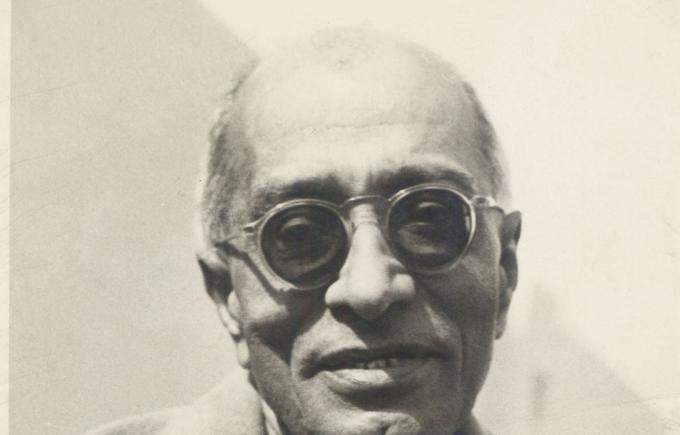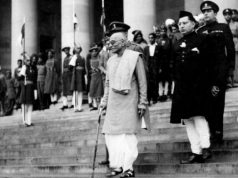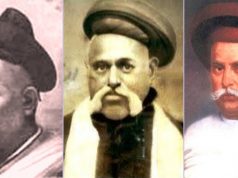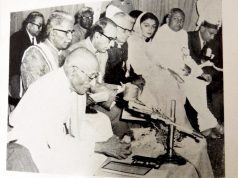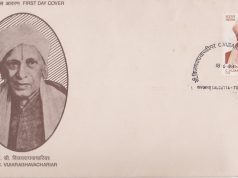The following article was published in the Swatantra Souvenir published in 1973; and was originally written by C Rajagopalachari in 1965. In the piece, Rajaji talks about the meaning of liberalism, and of Swatantra Party’s commitment to liberty.
Political Liberalism holds that the State should encroach as little as possible on the freedom of the individual, its function being to afford and keep order. The corresponding economic attitude is freedom of private enterprise in industry and commerce, free trade, and free competition. Ethically liberalism stands for liberty of thought, liberty of conscience, liberty of the Press, unhampered intellectual research and creation. Swatantra is the Sanskrit word for all this freedom.
The meaning of words suffers change in the course of events and people’s attitudes take different shapes in different countries. A liberal in US politics is very different from liberals in Germany or Britain. The original liberalism of the United States was the same as it was and continues to be in Germany or Britain. viz., the shaping of governance so as to diminish compulsion in social life and increase voluntary co-operation. Today a US ‘liberal’ politician stands for greater governmental authority over the citizen’s life; he stands for control and diminution of the citizen’s individual choices in his affairs; he supports State coercion where it is considered that such coercion is necessary for the public good, the decision resting with the Government; he supports Federal authority reducing State autonomy. We can thus see how much confusion can be caused in India by mixing up what is said about ‘liberals’ and ‘liberalism’ in current American literature. German and international liberalism in their general approach are identical with the Swatantra attitude. Not so American neo-liberalism.
Everyone agrees that governments should help the handicapped sections of the people out of public funds. Apart from this, the public good can be achieved in two ways, one: by leaving citizens free to judge for themselves and work for their own good and by State intervention only when individual action tends to hurt others; or two: by governments deciding what should be done by citizens and dictating by law what they should do and who should do. In India the latter way has been adopted by the Congress Party Government and it has taken the shape of the notorious Permit-Licence-Quota-raj.
Herbert Spencer ( 1820-1903), the great British philosopher of Evolution wrote:
“The fanatical adherents of a social theory are capable of taking any measures, no matter how extreme, for carrying out their views; holding, like the merciless priesthoods of past times, that the end justifies the means. And when a general socialistic organization has been established, the vast, ramified, and consolidated body of those who direct its activities, will use without check whatever coercion seems to them needful in the interests of the system, which will practically become their own interests. They will have no hesitation in imposing their rigorous rule over the entire lives of the actual producers, traders and other workers; until, eventually, there is developed an official oligarchy, with its various grades, exercising a tyranny more gigantic and more terrible than any which the world has seen.”
One can see in this a true picture of the present Indian scene. Taxation goes up in order to meet the cost of State intervention and transfer of management from the hands of the individuals who were interested in its being efficiently done to those of officials who enjoy power without factual responsibility. When any defects or failures are brought to light, the tendency of those in political authority is to defend the officials lest the philosophy of State intervention may be discredited by these oft-recurring lapses. For defraying the cost of carrying out the ever-multiplying regulations, each of which requires an additional staff of officers and for meeting and outlay for new State institutions, new taxes have to be levied and they are planned to be levied, always giving the benefit of doubt in regard to quantum to the Government.
“Hitherto you have been free to spend a portion of your earnings in any way which pleased you; hereafter you shall not be free so to spend it, but we will spend it for the general benefit”. This is how Herbert Spencer in anticipation put in simple language the socialist scheme of intrusion of the State for the public good. The coercion of older days was felt by political reformers to be evil, even if it was mitigated by many beneficent acts for the public good. The coercion exercised by present-day governments is ought to be justified by the argument that the governing body of a nation, which is in position as a result of free elections, is entitled to practise such coercion.
Herbert Spencer asks :
“If men use their liberty in such a way as to surrender their liberty, are they thereafter any the less slaves? If people by a plebiscite elect a man to be a despot over them, do they remain free because the despotism was of their own making? Are coercive edicts issued by him to be regarded as legitimate because they are the ultimate outcome of their own votes? The liberty which a citizen enjoys is to be measured, not by the nature of the governmental machinery he lives under, whether representative or other, but by the relative paucity of the restraints it imposes on him. Whether this machinery is or is not one he shared in making, its actions are not of the kind proper to liberalism if they increase such restraints beyond those which are needful for preventing him from directly or indirectly aggressing on his fellows.”
Elections do not improve men’s talents or character. The working of institutions is determined by men’s character. “There is no adequate endowment of character such as is required to prevent the growth of despotic bureaucracy”. These words of warning uttered by Herbert Spencer have been completely vindicated by what we have seen and are seeing in India today. Political parties in power inevitably become flourishing mutual benefit associations, as the Congress Party in India has become.
We have news that the Congress Party has put off the elections that are now due to constitute its important committees. It is not stated that this is because of the Chinese expansionist moves or to Pakistan’s aggression. The patent absurdity of such a claim seems now to have been realised. The postponement is just to cover up discord, to camouflage disunity so that no difficulties may be created in the way of continuing the present bosses in position.
The question will be asked, what is your constructive proposal to remedy the inevitable evils of party governments which you point out? The answer is that governments, whatever their composition, should not be allowed to have these powers of subtracting from the freedom of the individual. This was Herbert Spencer’s firm view. It was also the considered view of the fathers of the Indian Constitution as passed in 1950, which was embodied in the Fundamental Rights. Whatever party the government may be formed out of let there be minimum government and maximum freedom to the citizen: this is the answer to the question and this is what the Swatantra Party of India and Liberals all over the world stand for.
The new liberalism of the United States of America is an illegitimate product of what may be called the infection of the opposition. It has transformed itself into the opposite of what it originally was. Tolerance opposes intolerance but in order to gather and conserve strength for this purpose, it itself develops intolerance. All virtues and ideologies tend thus to be transformed and corrupted by a process analogous to electro-magnetic induction. Liberalism in order to meet the growing demands of an unenlightened crowd which refuses to be enlightened and impatiently presses for welfare through State coercion itself adopts its opponent’s coercive principles of governance. The cause of Freedom calls for true and sturdy defenders, who will not thus compound with evil, but work for freedom and enlightenment however hard or long the task may be. Otherwise in the long run while the party in office may gain power, freedom’s battle will be lost.
To access the complete piece, click here. Visit indianliberals.in for more works by Indian Liberals dating back to the 19th Century.
Post Disclaimer
The opinions expressed in this essay are those of the authors. They do not purport to reflect the opinions or views of CCS.

